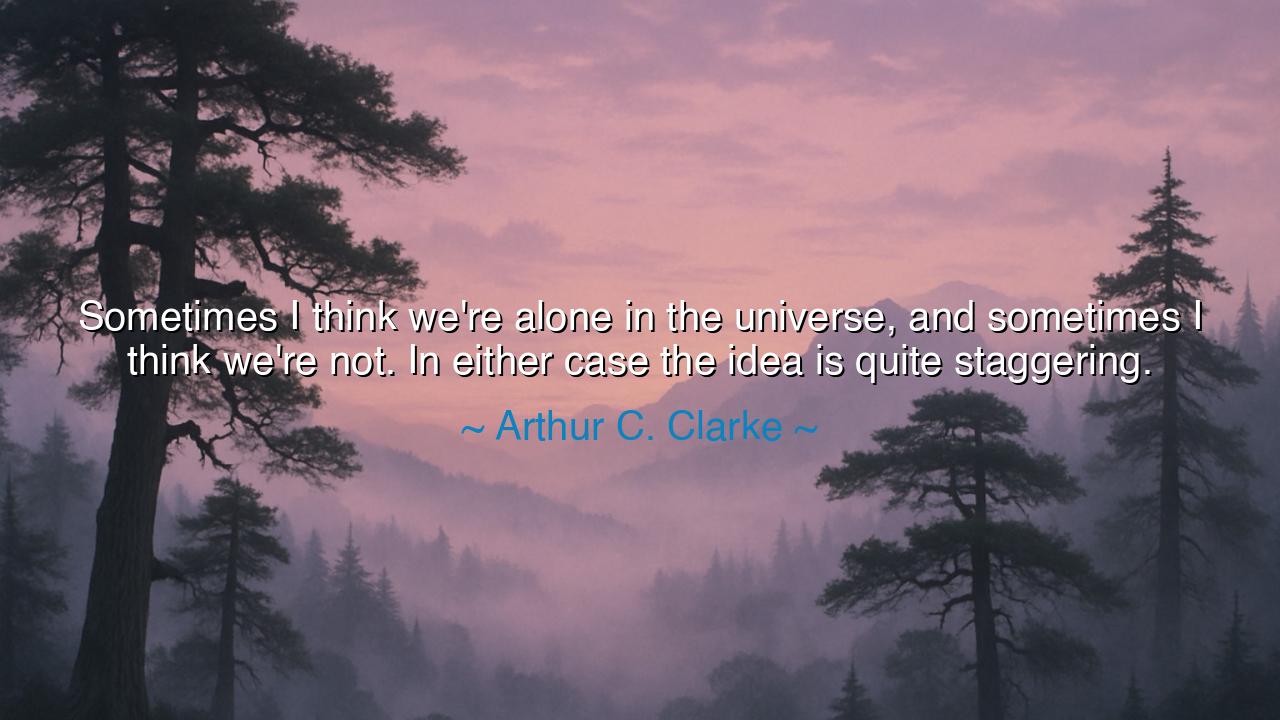
Sometimes I think we're alone in the universe, and sometimes I
Sometimes I think we're alone in the universe, and sometimes I think we're not. In either case the idea is quite staggering.






"Sometimes I think we're alone in the universe, and sometimes I think we're not. In either case the idea is quite staggering." These words from Arthur C. Clarke reflect the profound mystery and awe that comes with contemplating the vastness of the universe. Clarke, a visionary writer and thinker, opens a door to the human soul’s deepest questions: Are we truly alone, or is the cosmos teeming with life beyond our understanding? In his musings, Clarke captures both the solitude and connection that stir our hearts when we look to the stars. Whether or not we find ourselves as the sole sentient beings in this great expanse, the thought itself is overwhelming—a realization that invites both humility and wonder.
To think of ourselves as alone in the universe is to acknowledge the vast emptiness that surrounds us. In the grand expanse of space, we are but specks, fragile beings on a small planet in the midst of infinite stars. This view evokes a humbling feeling, where our human lives seem so insignificant in the context of the universe’s vast immensity. The ancient Greeks, who gazed at the night sky with awe, often considered the heavens as the domain of gods, where human lives were fleeting and insignificant in the grand design. Plato and Aristotle, in their reflections, understood the cosmos as something eternal and immutable, while mankind was but a brief flicker in the vast journey of the stars. To think of ourselves as alone in the cosmos is to feel the weight of isolation in the face of an indifferent, unchanging universe.
Yet, when Clarke turns the thought, asking if perhaps we are not alone, he confronts us with a more mysterious and exhilarating possibility. What if, somewhere in the vastness of the cosmos, other beings—intelligent, curious, and perhaps even more ancient than us—exist? What if they, too, ponder their place in the universe? This thought gives rise to hope, to a belief in the potential of connection with other life. It stirs in us the longing to reach out, to explore, to expand the boundaries of our understanding. Throughout history, great explorers—from Columbus to Magellan—have dared to journey into the unknown, driven by the belief that there is more to discover, more to understand. The idea of discovering life beyond Earth is just as stirring, a quest that might define the very future of humanity.
Consider the life of Carl Sagan, the great astronomer and cosmologist, who dedicated his life to exploring the possibility of extraterrestrial life. Sagan, much like Clarke, understood that the vastness of the universe made the question of life beyond Earth not just a matter of speculation, but of profound significance. His belief that the universe might be filled with life led him to champion the search for intelligent signals from distant stars. His work on the Arecibo message, the attempt to send humanity’s first message to other life forms, encapsulates the hope and ambition that Clarke’s words evoke: that in this immense universe, we are not isolated but connected to something far greater. The idea of contact with others in the universe is a journey of both intellectual curiosity and spiritual wonder.
The lesson embedded in Clarke’s words is one of reflection—the need to confront the mystery of existence itself. Whether we are alone or not in the universe, the thought of it is staggering because it forces us to confront the fragility and preciousness of life. It reminds us that we are part of something much larger than ourselves, something we can never fully comprehend. The vastness of the universe demands that we act with humility and respect, recognizing that our existence is both miraculous and impermanent. Whether or not we find other civilizations among the stars, we must learn to value our place in the cosmos, knowing that the mystery itself is what drives us to explore and question.
Clarke’s words also call us to embrace curiosity and discovery. The search for meaning, whether in the stars above or in our hearts, is part of the human condition. We are driven by a need to know, to understand, and to connect. And it is through this pursuit that we find our greatest strength. As we look to the skies, whether in the stillness of the night or in the silence of space exploration, we are reminded that the quest for knowledge is an infinite one, boundless in its scope. It encourages us to embrace the unknown, to venture into new frontiers, and to trust that in curiosity, there is always room for wonder.
In practical terms, this means that we should seek out the mysteries that lie before us—whether in the stars or in the depths of our own hearts. We must remain ever curious, open to the possibilities of what lies beyond our immediate understanding, and humble in our pursuit of knowledge. Just as the ancients gazed at the stars and dreamed of the unknown, so too should we continue to dream, to explore, and to ask the questions that drive us forward. Whether or not we are alone in the universe, the idea of it calls us to live lives of purpose and discovery, driven by a sense of wonder that knows no bounds.






AAdministratorAdministrator
Welcome, honored guests. Please leave a comment, we will respond soon